Heat Exchanger- အပုိင္း-၂
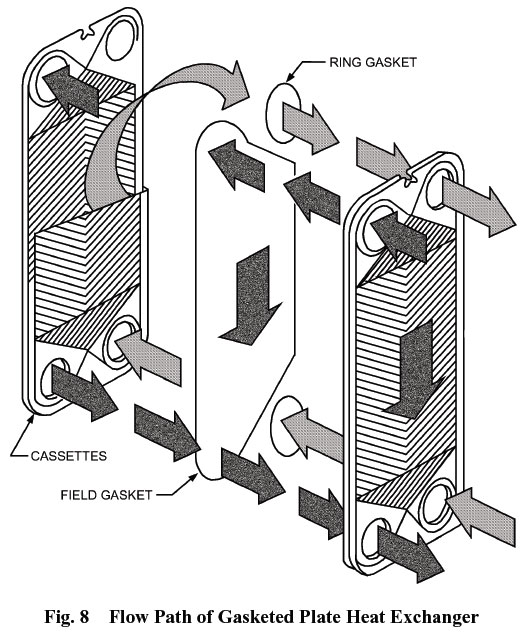
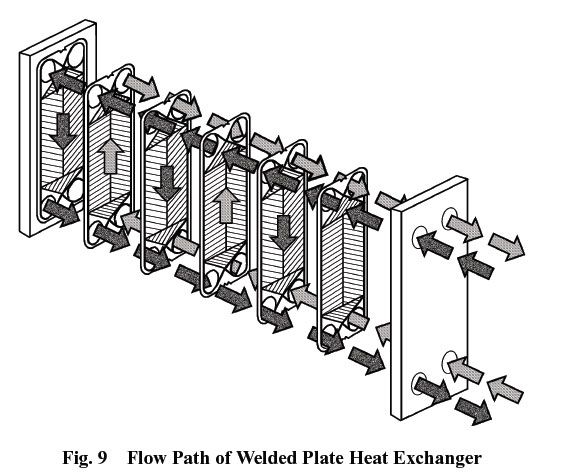
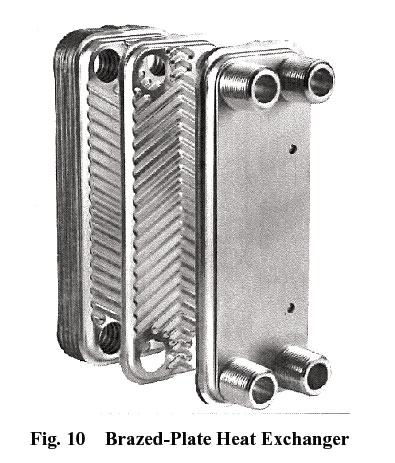
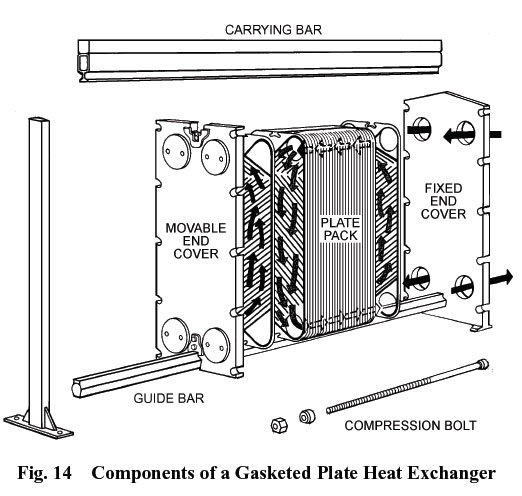
Plate Heat Exchangers
Plate heat exchangers ဆုိသည္မွာ hot fluid သီးသန့္ channel အတုိင္း
စီးရင္း၊ cold fluid သီးသန့္ channel အတုိင္း စီးရင္း၊ heat transfer
ၿဖစ္ေအာင္ metal plate အတြဲမ်ားကိုလုိက္ထပ္ထားၿခင္းၿဖစ္သည္။ အပူသည္ plate
နံရံမ်ား(plate walls)ကိုမွတဆင့္ၿဖတ္သန္းစီးဆင္းသြားသည္။
Exchanger တြင္ channel မ်ားကို တစ္ခုၿပီးတစ္ခု frame
တြဲ၍ ခ်ိတ္တြဲထားသည္။ plate မ်ား၏ ေထာင့္တြင္ အေပါက္ (opening or
port)မ်ားၿပဳလုပ္ထားသည္။ plate မ်ားအားလံုးကို အတူတကြတပ္ဆင္လုိက္လွ်င္ ထုိ
အေပါက္ (opening or port)မ်ားသည္ fluid မ်ားစီးဝင္ရန္ အတြက္ manifold
မ်ားအၿဖစ္သို့ေရာက္ရွိသြားသည္။ စီးဆင္းရာလမ္းေၾကာင္း(flow paths)ကို
ၿဖစ္ေစသည္။
Plate မ်ားစြာ ခ်ိတ္တြဲထားၿခင္းကို plate pack
ဟုေခၚသည္။ plate pack မ်ားကို ထိန္းထားေပးရန္ bar တစ္ခုလိုအပ္သည္။ ထုိသုိ့
ဒီဇုိင္းၿပဳလုပ္ထားၿခင္းေၾကာင့္ plate pack ကို ဖြင့္ ၿပီး plate
မ်ားတစ္ခုၿခင္းကို ေဆးေၾကာႏုိင္သည္။ Plate ထပ္ထည့္ၿခင္းၿဖင့္
ပိုမုိၿမင့္မားသည့္ Capacity လုိအပ္ပါ ရရွိနုိင္သည္။ ထုိအတူ မလုိအပ္သည့္
Plate မ်ားကို ၿဖဳတ္ထုပ္နုိင္သည္။
Plat ကို gasket မ်ားၿဖင့္ေသာ္လည္းေကာင္း- welding
ေဆာ္ၿခင္းၿဖင့္ေသာ္လည္းေကာင္း- brazing
လုပ္ၿခင္းၿဖင့္ေသာ္လည္းေကာင္းခ်ိတ္တြဲတပ္ဆင္နုိင္သည္။
Gasket မ်ားၿဖင့္ တပ္ဆင္ထားေသာ plate heat exchanger မ်ားသည္ အမ်ားဆံုး 2 MPa ဖိအားအထိသာ ခံနုိင္သည္။
အသံုးၿပဳသည့္ gasket material အမ်ိဳးအစား
(ရာဘာ-ပလပ္စတစ္ စသည္တို့)ကိုလုိက္၍ ခံနုိင္သည္ အပူခ်ိန္သည္ ကြာၿခားသည္။
Brazed plate မ်ားသည္ ဖိအား 3 MPa ႏွင့္ အပူခ်ိန္ (temperatures) 260°C
အထိခံနုိင္ၾကသည္။
Gasket plate heat exchanger မ်ားသည္
အသံုးမ်ားဆံုးၿဖစ္သည္။ nitrile butyl rubber (NBR) ၿဖင့္ၿပဳလုပ္ထားေသာ
gaskets မ်ားသည္ အပူခ်ိန္ 110°C အထိသာ ခံနုိင္ရည္ရွိသည္။
Ethylene-propylene terpolymer (EPDM) gaskets သည္ အပူခ်ိန္ 160°C အထိ
ခံနုိင္ရည္ရွိသည္။ gasket ကို plate ေပၚတြင္ ေကာ္ၿဖင့္ကပ္၍ေသာ္လည္းေကာင္း၊
ကလစ္မ်ားၿဖင့္ကပ္၍ေသာ္လည္းအသံုးၿပဳၾကသည္။
Gasket ပံုစံမ်ားကို counterflow လမ္းေၾကာင္းအတိုင္းစီးဆင္းသြားေအာင္ၿပဳလုပ္ထားၾကသည္။
Welded.
Plate ႏွစ္ခု၏အစြန္းကို ဂေဟေဆာ္ထားၿခင္းၿဖင့္တြဲထားလွ်င္ cassette ဟုေခၚသည္။ အက္စစ္မ်ား၊ သံေခ်းတတ္လြယ္ေသာ fluid မ်ားအတြက္ သင့္ေလွ်ာ္ေသာ
gasket material အမ်ိဳးအစား မရနုိင္လွ်င္ ဂေဟေဆာ္သည့္နည္းကို
အသံုးၿပဳသည္။ non-aggressive fluid မ်ားအတြက္ standard gasket မ်ားကို
အသံုးၿပဳၾကသည္။ refrigeration လုပ္ငန္းမ်ားအတြက္ ဂေဟေဆာ္သည့္ heat
exchanger မ်ားကို အသံုးၾကသည္လည္းရွိသည္။
Brazed.
gasket ႏွင့္ frame မ်ား သံုးမရသည့္ အခါ Brazed-plate
heat exchangers မ်ားကို ၿပဳလုပ္ၾကသည္။ copper or nickel အတံုးထဲတြင္
plates မ်ားကို ထည့္က brazing လုပ္ၿခင္းၿဖစ္သည္။
ၿပဳၿပင္ထိန္းသိမ္းရန္မလုိသည့္ closed-system applications မ်ားအတြက္
အလြန္ကုန္က်စရိတ္သက္သာသည့္ နည္းလမ္းေကာင္းၿဖစ္သည္။
heat exchanger နံရံမ်ား ေပါက္သြားသည့္ အခ်ိဳ ့ေသာ
fluid မ်ားသည္ အလြန္အႏၱရာယ္မ်ားသည္။ေပါက္ကြဲတတ္သည္။ ထုိေၾကာင့္ heat
exchanger နံရံမ်ားကိုနွစ္ထပ္ၿပဳလုပ္ထားၾကသည္။ Double-wall heat exchanger
ဟုေခၚသည္။ Double-wall heat exchangerကုိ shell-and-tube ႏွင့္ plate
heat exchangers ႏွစ္မ်ိဳးလံုးတြင္ရနုိင္သည္။
Double-wall heat exchanger ၏ overall thermal performance သည္ single-wall ေလာက္မေကာင္းေပ။ ေစ်းလည္းပိုမ်ားသည္။
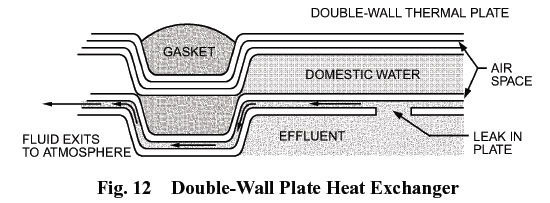 အထက္ပါ ပံု၁၂ တြင္double-wall plate heat exchanger တစ္ခု ၏welding ၿဖင့္ဆက္ထားေသာ Plate ႏွစ္ခု ႏွင့္ Gasket ကို ၿပထားသည္
အထက္ပါ ပံု၁၂ တြင္double-wall plate heat exchanger တစ္ခု ၏welding ၿဖင့္ဆက္ထားေသာ Plate ႏွစ္ခု ႏွင့္ Gasket ကို ၿပထားသည္
COMPONENTS
HVAC applications အတြက္ ထုပ္လုပ္ သို့တည္ေဆာက္ထားေသာ Heat exchangers မ်ားတြင္ ASME Boiler and Pressure
Vessel Code ပါသည့္ ေလဘယ္မ်ားကို ေဖာ္ၿပထားရမည္ၿဖစ္ၿပီး အပူခ်ိန္ 190°C တြင္ ဖိအား 1000 kPa ကို အထိခံနုိင္ရမည္။
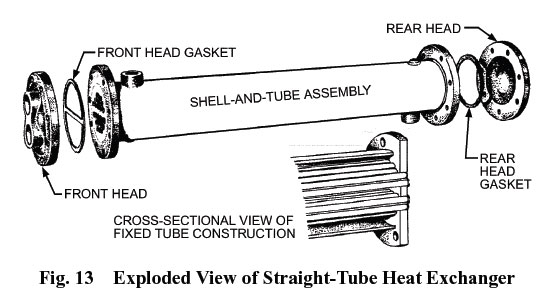 Shell-and-Tube Components
အထက္ပါပံု၁၃ တြင္ၿပထားသည့္ shell-and-tube exchanger တြင္ ေအာက္ပါ component မ်ားပါဝင္သည္။
Shell-and-Tube Components
အထက္ပါပံု၁၃ တြင္ၿပထားသည့္ shell-and-tube exchanger တြင္ ေအာက္ပါ component မ်ားပါဝင္သည္။
က) Shells
ခ) Baffles, tube supports, tie rods, and spacers
ဂ) Tubes
ဃ) Tubesheets
င) Heads တုိ့ပါဝင္သည္။
• Shells ကို steel pipe မ်ား၊ ေၾကး ႏွင့္ stainless
steel မ်ားၿဖင့္ၿပဳလုပ္ေလ့ရွိသည္။ The inlet and outlet nozzles မ်ားကို
တပ္ဆင္မွဳလြယ္ကူရန္ လူသံုးမ်ားသည့္ flange မ်ားၿဖင့္ ၿပဳလုပ္ထားသည္။
nozzles မ်ား၏ အဝ အက်ယ္ကို fluid velocity မ်ားေစရန္ႏွင့္ impingement on
the tubes ေပၚတြင္ impingement မၿဖစ္ေစရန္ ၿပဳလုပ္ထားသည္။
• Baffles, tube supports, tie rods, and spacers တုိ့
ကို ေၾကး ႏွင့္ stainless steel မ်ားၿဖင့္ၿပဳလုပ္ေလ့ရွိသည္။ baffle
အေရတြက္ႏွင့္ baffle တစ္ခုႏွင့္တစ္ခုအၾကားအကြာအေဝးသည္ velocity
နည္းၿခင္းမ်ားၿခင္းကိုၿဖစ္ေစသည္။ velocity မ်ားၿခင္းေၾကာင့္ shell-side
heat transfer coefficient က်ဆင္းၿပီး pressure drop ပိုမ်ားလာသည္။
• Tubes steel pipe မ်ား၊ ေၾကး၊ အထူးအရည္အေသြးေကာင္းေသာ brass မ်ား ႏွင့္ stainless steel မ်ားၿဖင့္ၿပဳလုပ္ေလ့ရွိသည္။
tube diameter, အထူ (gage) ႏွင့္ အမ်ိဳးအစား (material)
မ်ားသည္ heat transfer coefficient ႏွင့္ exchanger ၏ စြမ္းေဆာင္မွဳ
(performance) ကိုေၿပာင္းလဲေစသည္။ .
• Tubesheets မ်ားသည္ baffles ၿပဳလုပ္သည္ သတၱဳအမ်ိဳးအစားမ်ားနွင့္တူညီေလ့ရွိသည္။
Tubesheets မ်ားကို လုိအပ္သည့္ tube layout မ်ားအတုိင္း ရေအာင္အေပါက္မ်ားေဖာက္ေလ့ရွိသည္။ ထုိအေပါက္မ်ားပါေသာ tube layout ကို pitch ဟုေခၚေလ့ရွိသည္။
• Heads မ်ားကို အမ်ားအားၿဖင့္ cast iron သို့
fabricated steel ၿဖင့္ ၿပဳလုပ္ေလ့ရွိသည္။ ေသးငယ္ေသာ exchanger မ်ားအတြက္
Cast brass ႏွင့္ cast
stainless steel တုိ့ၿဖင့္လည္းၿပဳလုပ္ၾကသည္။ Head
မ်ားသည္လုိအပ္သည့္ေနရာ သို့ တပ္ဆင္မည့္ေနရာတို့ဝင္ အဆင္ေၿပေအာင္ အံဝင္ေအာင္
ၿပဳလုပ္ထားၾကသည္။
Plate Components
 အထက္ပါပံုတြင္ Plate heat exchanger၏ gasketed plate ႏွင့္ frame တုိ့ကိုခြဲၿပထားသည္။
အထက္ပါပံုတြင္ Plate heat exchanger၏ gasketed plate ႏွင့္ frame တုိ့ကိုခြဲၿပထားသည္။
ေအာက္တြင္
Component မ်ား၏ လုပ္ေဆာင္ခ်က္မ်ားနွင့္ ၿပဳလုပ္သည့္ သတၱဳအမ်ိဳးအစားမ်ားကို ေဖာ္ၿပထားသည္။
• Fixed frame plates ကို carbon steelၿဖင့္ၿပဳလုပ္သည္။
Single-pass Plate heat exchanger တြင္ Hot fluid ႏွင့္
Cold fluid နွစ္မ်ိဳးလံုး၏ inlet and outlet တို့သည္ fixed frame plate
ဘက္တြင္သာရွိၾကသည္။ တနည္း fixed frame plate ဘက္တြင္ ပိုက္ Connection ၄
ခုလံုးရွိလွ်င္ Single-pass Plate heat exchanger ၿဖစ္သည္။ ANSI အမ်ိဳးအစား
flanges အတြက္ Connections မ်ားသည္ NPT သို့ stud port
ဒီဇုိင္းမ်ားၿဖစ္သည္။
NPT connections မ်ားသည္ carbon steel သုိ့ stainless steel
သတၱဳမ်ားၿဖစ္သည္။ Stud port connections မ်ားကို corrosion ၿဖစ္ၿခင္းမွ
ကာကြယ္ရန္အထဲတြင္ၿမဳတ္ထားေလ့ရွိသည္။
• Movable pressure plates ကို capacity တို့ရန္အတြက္
plates အသစ္မ်ားထပ္ထည့္ရန္၊ plates ထုပ္ၿဖစ္ရန္ ႏွင့္ plates အသစ္လဲလွယ္ရန္
ဒီဇုိင္းလုပ္ထားသည္။ Movable pressure plates သည္ carrying bar ၏
တစ္ေလွ်ာက္တြင္ ေရႊ ့နုိင္ ရန္ ္ ၿပဳလုပ္ ထားၿခင္းၿဖစ္သည္။carbon steel
ၿဖင့္ ၿပဳလုပ္ထားသည္။
• Plate packs မ်ားသည္ (channel) plates ႏွင့္ gaskets
တုိ့ၿဖင့္ၿပဳလုပ္ထားသည္။ Plates မ်ားသည္ stainless steel 316 အမ်ိဳးအစား၊
stainless steel 304 အမ်ိဳးအစား သုိ့ titanium မ်ားၿဖစ္သည္။herringbone
ပံုစံမ်ိဳး သို့ chevron ပံုစံမ်ိဳး ၿပဳလုပ္ေလ့ရွိသည္။ herringbone သို့
chevron pattern မ်ား ၏ ေထာင့္မ်ားသည္ the thermal performance ေကာင္းၿခင္း
ဆိုးၿခင္း ႏွင့္ pressure drop မ်ားၿခင္း။ နည္းၿခင္းတုိ့ကို ၿဖစ္ေစသည္။
Compression bolts မ်ားသည္ plate မ်ားကို Movable pressure plates ႏွင့္ Fixed frame plates တို့အတြင္းတြင္ ရွိေအာင္ ဖိထားၿခင္းၿဖစ္သည္။ ထုိေၾကာင့္ Fluid မ်ားမယုိစီးေတာ့ေပ။
• Carrying and guide bars မ်ားသည္ channel plates မ်ား အားထိန္းေပးထားၿခင္းၿဖစ္သည္။အေပၚတန္းကို carrying barဟုေခၚသည္။ ေအာက္တန္းကို guide bar ဟုေခၚသည္။
stainless steel, aluminum, သို့ carbon steel မ်ားၿဖင့္ၿပဳလုပ္ၿပီး zinc chromate ၿဖင့္ အေခ်ာသတ္သုတ္လိမ္းၾကသည္။
• Support columns သည္ plate heat exchangers မ်ားတြငcarrying and guide bars ထမ္းထားသည္။
• Splashguards မ်ားကို aluminum ၿဖင့္ၿပဳလုပ္သည္။
• Drip pans ကို stainless steel ၿဖင့္ၿပဳလုပ္သည္။
စတင္အသံုးၿပဳသည့္အခါ ။ shut down လုပ္သည့္အခါ ။ ယိုစီးၿခင္းၿဖစ္သည့္အခါ။
gasket မ်ားေပါက္ၿပဲသည့္အခါ။ ႏွင့္ condensation ၿဖစ္သည့္အခါမ်ားတြင္
ေရမ်ား ကို ေဘးသို့မေရာက္ေအာင္ စုေပးထားသည္။
ေကာင္းထက္ညြန့္




Plate heat exchangers ဆုိသည္မွာ hot fluid သီးသန့္ channel အတုိင္း စီးရင္း၊ cold fluid သီးသန့္ channel အတုိင္း စီးရင္း၊ heat transfer ၿဖစ္ေအာင္ metal plate အတြဲမ်ားကိုလုိက္ထပ္ထားၿခင္းၿဖစ္သည္။ အပူသည္ plate နံရံမ်ား(plate walls)ကိုမွတဆင့္ၿဖတ္သန္းစီးဆင္းသြားသည္။
Ethylene-propylene terpolymer (EPDM) gaskets သည္ အပူခ်ိန္ 160°C အထိ ခံနုိင္ရည္ရွိသည္။ gasket ကို plate ေပၚတြင္ ေကာ္ၿဖင့္ကပ္၍ေသာ္လည္းေကာင္း၊ ကလစ္မ်ားၿဖင့္ကပ္၍ေသာ္လည္းအသံုးၿပဳၾကသည္။
Plate ႏွစ္ခု၏အစြန္းကို ဂေဟေဆာ္ထားၿခင္းၿဖင့္တြဲထားလွ်င္ cassette ဟုေခၚသည္။ အက္စစ္မ်ား၊ သံေခ်းတတ္လြယ္ေသာ fluid မ်ားအတြက္ သင့္ေလွ်ာ္ေသာ gasket material အမ်ိဳးအစား မရနုိင္လွ်င္ ဂေဟေဆာ္သည့္နည္းကို အသံုးၿပဳသည္။ non-aggressive fluid မ်ားအတြက္ standard gasket မ်ားကို အသံုးၿပဳၾကသည္။ refrigeration လုပ္ငန္းမ်ားအတြက္ ဂေဟေဆာ္သည့္ heat exchanger မ်ားကို အသံုးၾကသည္လည္းရွိသည္။
Double-wall heat exchanger ၏ overall thermal performance သည္ single-wall ေလာက္မေကာင္းေပ။ ေစ်းလည္းပိုမ်ားသည္။

Vessel Code ပါသည့္ ေလဘယ္မ်ားကို ေဖာ္ၿပထားရမည္ၿဖစ္ၿပီး အပူခ်ိန္ 190°C တြင္ ဖိအား 1000 kPa ကို အထိခံနုိင္ရမည္။

က) Shells
• Shells ကို steel pipe မ်ား၊ ေၾကး ႏွင့္ stainless steel မ်ားၿဖင့္ၿပဳလုပ္ေလ့ရွိသည္။ The inlet and outlet nozzles မ်ားကို တပ္ဆင္မွဳလြယ္ကူရန္ လူသံုးမ်ားသည့္ flange မ်ားၿဖင့္ ၿပဳလုပ္ထားသည္။ nozzles မ်ား၏ အဝ အက်ယ္ကို fluid velocity မ်ားေစရန္ႏွင့္ impingement on the tubes ေပၚတြင္ impingement မၿဖစ္ေစရန္ ၿပဳလုပ္ထားသည္။
• Baffles, tube supports, tie rods, and spacers တုိ့ ကို ေၾကး ႏွင့္ stainless steel မ်ားၿဖင့္ၿပဳလုပ္ေလ့ရွိသည္။ baffle အေရတြက္ႏွင့္ baffle တစ္ခုႏွင့္တစ္ခုအၾကားအကြာအေဝးသည္ velocity နည္းၿခင္းမ်ားၿခင္းကိုၿဖစ္ေစသည္။ velocity မ်ားၿခင္းေၾကာင့္ shell-side heat transfer coefficient က်ဆင္းၿပီး pressure drop ပိုမ်ားလာသည္။
• Tubes steel pipe မ်ား၊ ေၾကး၊ အထူးအရည္အေသြးေကာင္းေသာ brass မ်ား ႏွင့္ stainless steel မ်ားၿဖင့္ၿပဳလုပ္ေလ့ရွိသည္။
• Tubesheets မ်ားသည္ baffles ၿပဳလုပ္သည္ သတၱဳအမ်ိဳးအစားမ်ားနွင့္တူညီေလ့ရွိသည္။
Tubesheets မ်ားကို လုိအပ္သည့္ tube layout မ်ားအတုိင္း ရေအာင္အေပါက္မ်ားေဖာက္ေလ့ရွိသည္။ ထုိအေပါက္မ်ားပါေသာ tube layout ကို pitch ဟုေခၚေလ့ရွိသည္။
• Heads မ်ားကို အမ်ားအားၿဖင့္ cast iron သို့ fabricated steel ၿဖင့္ ၿပဳလုပ္ေလ့ရွိသည္။ ေသးငယ္ေသာ exchanger မ်ားအတြက္ Cast brass ႏွင့္ cast
stainless steel တုိ့ၿဖင့္လည္းၿပဳလုပ္ၾကသည္။ Head မ်ားသည္လုိအပ္သည့္ေနရာ သို့ တပ္ဆင္မည့္ေနရာတို့ဝင္ အဆင္ေၿပေအာင္ အံဝင္ေအာင္ ၿပဳလုပ္ထားၾကသည္။
Plate Components

ေအာက္တြင္ Component မ်ား၏ လုပ္ေဆာင္ခ်က္မ်ားနွင့္ ၿပဳလုပ္သည့္ သတၱဳအမ်ိဳးအစားမ်ားကို ေဖာ္ၿပထားသည္။
• Fixed frame plates ကို carbon steelၿဖင့္ၿပဳလုပ္သည္။
NPT connections မ်ားသည္ carbon steel သုိ့ stainless steel သတၱဳမ်ားၿဖစ္သည္။ Stud port connections မ်ားကို corrosion ၿဖစ္ၿခင္းမွ ကာကြယ္ရန္အထဲတြင္ၿမဳတ္ထားေလ့ရွိသည္။
• Movable pressure plates ကို capacity တို့ရန္အတြက္ plates အသစ္မ်ားထပ္ထည့္ရန္၊ plates ထုပ္ၿဖစ္ရန္ ႏွင့္ plates အသစ္လဲလွယ္ရန္ ဒီဇုိင္းလုပ္ထားသည္။ Movable pressure plates သည္ carrying bar ၏ တစ္ေလွ်ာက္တြင္ ေရႊ ့နုိင္ ရန္ ္ ၿပဳလုပ္ ထားၿခင္းၿဖစ္သည္။carbon steel ၿဖင့္ ၿပဳလုပ္ထားသည္။
• Plate packs မ်ားသည္ (channel) plates ႏွင့္ gaskets တုိ့ၿဖင့္ၿပဳလုပ္ထားသည္။ Plates မ်ားသည္ stainless steel 316 အမ်ိဳးအစား၊ stainless steel 304 အမ်ိဳးအစား သုိ့ titanium မ်ားၿဖစ္သည္။herringbone ပံုစံမ်ိဳး သို့ chevron ပံုစံမ်ိဳး ၿပဳလုပ္ေလ့ရွိသည္။ herringbone သို့ chevron pattern မ်ား ၏ ေထာင့္မ်ားသည္ the thermal performance ေကာင္းၿခင္း ဆိုးၿခင္း ႏွင့္ pressure drop မ်ားၿခင္း။ နည္းၿခင္းတုိ့ကို ၿဖစ္ေစသည္။
Compression bolts မ်ားသည္ plate မ်ားကို Movable pressure plates ႏွင့္ Fixed frame plates တို့အတြင္းတြင္ ရွိေအာင္ ဖိထားၿခင္းၿဖစ္သည္။ ထုိေၾကာင့္ Fluid မ်ားမယုိစီးေတာ့ေပ။
stainless steel, aluminum, သို့ carbon steel မ်ားၿဖင့္ၿပဳလုပ္ၿပီး zinc chromate ၿဖင့္ အေခ်ာသတ္သုတ္လိမ္းၾကသည္။
• Support columns သည္ plate heat exchangers မ်ားတြငcarrying and guide bars ထမ္းထားသည္။
• Splashguards မ်ားကို aluminum ၿဖင့္ၿပဳလုပ္သည္။
• Drip pans ကို stainless steel ၿဖင့္ၿပဳလုပ္သည္။ စတင္အသံုးၿပဳသည့္အခါ ။ shut down လုပ္သည့္အခါ ။ ယိုစီးၿခင္းၿဖစ္သည့္အခါ။ gasket မ်ားေပါက္ၿပဲသည့္အခါ။ ႏွင့္ condensation ၿဖစ္သည့္အခါမ်ားတြင္ ေရမ်ား ကို ေဘးသို့မေရာက္ေအာင္ စုေပးထားသည္။

No comments:
Post a Comment
အခုလို လာေရာက္အားေပးၾကတာ အထူးပဲ ၀မ္းသာ ပီတိျဖစ္ရပါတယ္ဗ်ား ... ။ေက်းဇူးအထူးတင္ပါတယ္။
ေက်ာ္ထက္၀င္း နည္းပညာ (ဘားအံ)
www.kyawhtetwin.blogspot.com